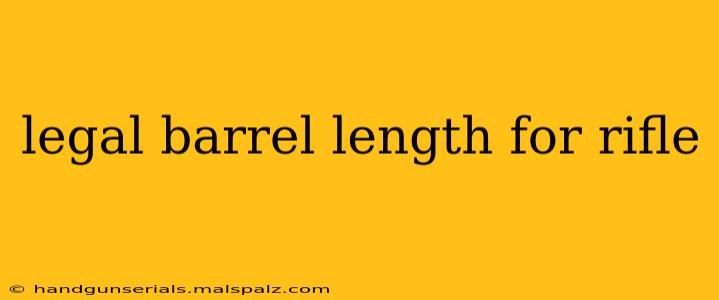Navigating the legal world of firearm ownership can be complex, especially when it comes to understanding regulations surrounding barrel length. This guide provides a comprehensive overview of legal rifle barrel lengths in the United States, emphasizing that laws vary significantly by state and even local jurisdictions. Always verify your local and state laws before purchasing or modifying any firearm. This information is for educational purposes only and should not be considered legal advice.
What Determines Legal Barrel Length?
The legal minimum barrel length for rifles is primarily governed by federal law under the National Firearms Act (NFA) of 1934, as amended. This act defines certain firearms as "short-barreled rifles" (SBRs) if their barrel length falls below a specific threshold. This threshold is generally 16 inches. Rifles with barrels shorter than 16 inches are subject to additional regulations, including registration with the Bureau of Alcohol, Tobacco, Firearms and Explosives (ATF) and the payment of a significant tax.
It's crucial to understand that the 16-inch minimum applies to the barrel's length, not the overall length of the weapon. The overall length is also regulated, but that's a separate issue.
Beyond Federal Law: State and Local Ordinances
While the 16-inch minimum is a federal guideline, many states and localities have their own regulations that might impose stricter limits or additional requirements. Some jurisdictions may completely ban the ownership of SBRs, regardless of federal compliance. This is why checking your local and state laws is absolutely paramount. Failing to do so can lead to serious legal consequences.
Understanding the NFA and its Implications
The NFA's regulations are designed to control the manufacture, sale, and ownership of certain firearms considered to pose a higher risk. Short-barreled rifles are included in this category due to their increased maneuverability and potential for concealment. The stringent registration and tax requirements serve as a deterrent and aid in tracking these weapons.
Penalties for Non-Compliance
Violating the NFA's provisions regarding barrel length can result in significant penalties, including:
- Heavy fines: These can reach tens of thousands of dollars.
- Imprisonment: Jail time is a possibility for serious violations.
- Forfeiture of firearms: The illegal firearm and any associated equipment may be seized by authorities.
Finding Your State's Specific Regulations
To find the specific regulations in your state, you should consult:
- Your state's attorney general's website: Many attorney general's offices provide information on firearms laws.
- Your state's department of public safety or equivalent agency: These agencies often handle firearms licensing and regulation.
- A qualified legal professional: Consulting with an attorney specializing in firearms law is highly recommended, especially if you have any doubts or specific questions.
Disclaimer: The information provided here is for general educational purposes only and should not be construed as legal advice. Always consult with your local and state authorities and/or legal counsel to ensure compliance with all applicable laws and regulations. Improper handling of firearms can be extremely dangerous; always practice safe gun handling.

